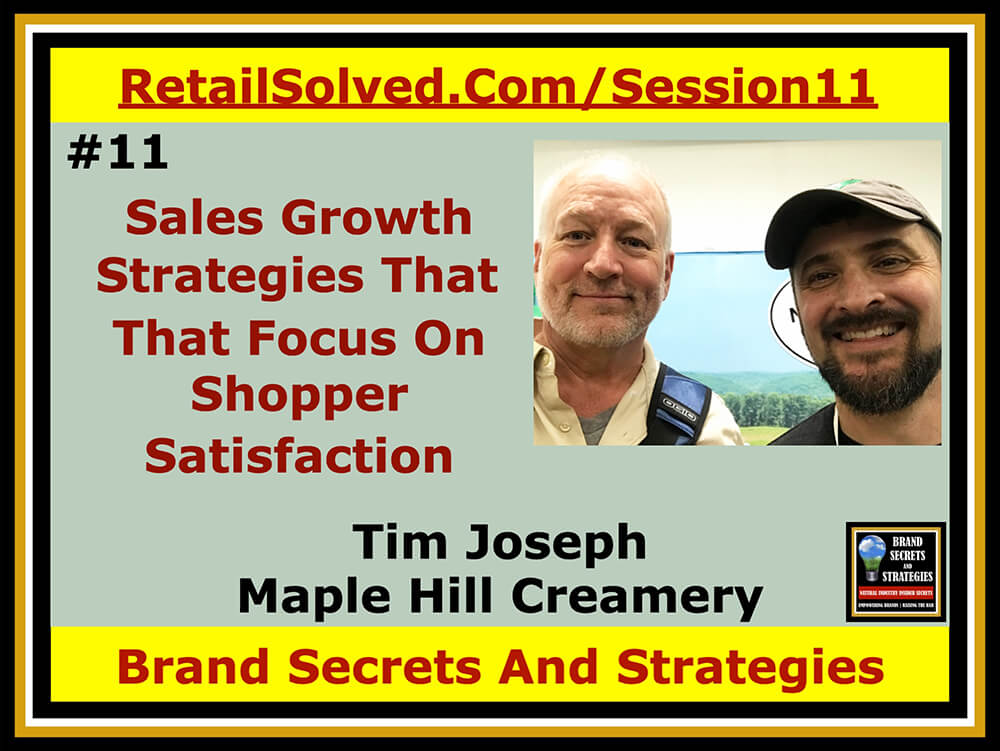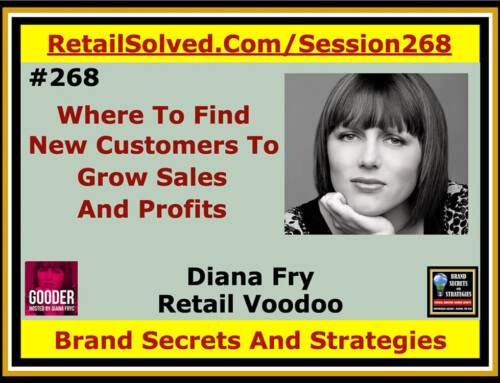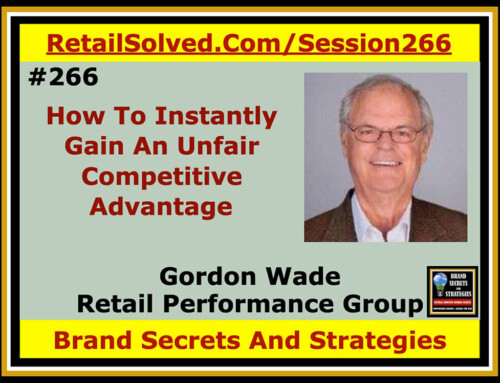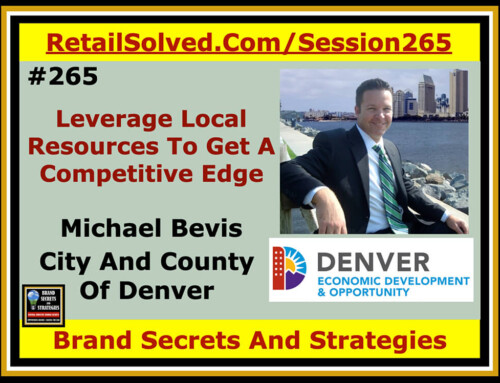Today, I have an inspiring store for you. It’s the ultimate American success story about an accidental farmer and how he carefully listened to consumers and trusted gut eventually spearheading a powerful initiative to bring transparency and authenticity back into our food system. Tim’s story includes bringing small local farmers together to support and produce the healthy products shoppers want.
You are what you eat.
That statement goes well beyond the ingredient label. Todays BRAND SECRETS AND STRATEGIES podcast focuses the importance of the ingredients beyond what is not printed on the product label – the part that is most important to your health.
Today's story is about a brand that listened carefully to their consumer base, going well beyond their peers, giving back to the community, and making sustainable change by helping to lead an initiative to dramatically change the way healthy, nutritious products pass from farm to table.
You've heard the expression “You are what you eat.” That statement goes well beyond the ingredients listed on the label, and also includes how the animals are fed, what they're fed and the products that they produce as a result. Today's story is about an innovative brand, that was able to leverage their ability to listen to the consumer, to not only help their local community but to provide healthy, nutritious products that now are resonating with consumers all across the country.
I'm excited and looking forward to introducing you to Tim Joseph, the CEO of Maple Hill Creamery. I go out of my way to bump into Tim at trade shows. One, because I love his product, and two, because I love his story. It's amazing. His “overnight success,” and you probably hear him laughing in the background, is a story of not only inspiration, but it's also a story of hope, and it's a story of how one person can make such a dramatic difference in the industry
Download the show notes below
Click here to learn more about Maple Hill Creamery
BRAND SECRETS AND STRATEGIES PODCAST #11 Hello and thank you for joining us today. This is the Brand Secrets and Strategies Podcast #11 Welcome to the Brand Secrets and Strategies podcast where the focus is on empowering brands and raising the bar. I’m your host Dan Lohman. This weekly show is dedicated to getting your brand on the shelf and keeping it there. Get ready to learn actionable insights and strategic solutions to grow your brand and save you valuable time and money. LETS ROLL UP OUR SLEEVES AND GET STARTED! Dan: Welcome. I spend a lot of time on this podcast and in my content talking about how brands need to actively listen to their core consumers, how their success is reliant upon giving customers exactly what they need. Today's story is about a brand that listened carefully to their consumer base, going well beyond their peers, giving back to the community, and making sustainable change by helping to lead an initiative to dramatically change the way healthy, nutritious products pass from farm to table. You've heard the expression "You are what you eat." That statement goes well beyond the ingredients listed on the label, and also includes how the animals are fed, what they're fed and the products that they produce as a result. Today's story is about an innovative brand, that was able to leverage their ability to listen to the consumer, to not only help their local community, but to provide healthy, nutritious products that now are resonating with consumers all across the country. I'm excited and looking forward to introducing you to Tim Joseph, the CEO of Maple Hill Creamery. I go out of my way to bump into Tim at trade shows. One, because I love his product, and two, because I love his story. It's amazing. His "overnight success," and you probably hear him laughing in the background, is a story of not only inspiration, but it's also a story of hope, and it's a story of how one person can make such a dramatic difference in the industry. Tim, would you please share a little bit about yourself with our audience? Tim: Sure. The whole story of Maple Hill and how it started way back had nothing to do with Maple Hill Creamery, but just my desire as a 13-year old to become a farmer. I didn't grow up in a farming background, but had for whatever reason decided at around 13 that I was interested in becoming a farmer. Always grew up in, believe it or not, a rural area of New Jersey and Western New Jersey on the Pennsylvania side, and had grown up in sort of in a pretty rural environment, but never production agriculture. Then started just sort of messing around with things related to agriculture through high school and college. Went to a bunch of grazing conferences and things like that, visited Joel Salatin's farm way back before he was the mega cool guy he is now. It was really a neat experience. After college, did a bunch of things, again having nothing to do with farming, but it was always sort of this thread of interest through my life, and was working from home, in the corporate world. It was around 2002. My wife and I were talking and, basically, just said, "Well, if we're working from home, if we're ever gonna try this farming thing, maybe now is the time to do it." So, I literally drove like in strips across New York State ... We were living in New York State at the time ... to try to find sort of the area that was affordable, wanted to live, thought we could live. Found a farm, bought a farm in 2003 in Little Falls, New York, which is sort of dead center, if there is a center of New York state, in central New York. Then, a year later, got the bright idea that I need regular income from this farm if I'm ever gonna leave my corporate job. Didn't know how to grow crops, because I didn't grow up in a farming background. They only pay once a year anyway. So I thought, "Well, cows, you get paid every month, milking cows. So, let's do that." We bought 60 cows from a guy who was getting out. It was a grazing herd. That was the first time I'd ever milked a cow was when those cows got off the truck in our driveway. We put them in the barn. The lady we bought the farm from came back, showed me how to turn the milking machines on, get it going. That was our start in dairy. We struggled from 2003 right on up through 2007, when we finally went organic. Through that period, we had done it all, the sort of traditional, conventional ways of mixing grain, and a nutritionist and vet coming every month and all that. Little by little, just sort of became disenchanted with that. It wasn't working for us. I was always really just for whatever crazy reason interested in getting the grain out of the system and just grazing, which at the time was really complete and total heresy. It was even heresy that we put on our cows out on "hay ground," which was the tillable land around our barn, which was the closest to the barn, which is the easiest and best ground to graze was where they made hay for all those years. We were putting cows on hay ground, which was just even worse. We realized that hey we're really close to being organic. Let's go and get certified. We can improve our milk price. It was really where we were headed anyway, so we did that, became organic valley farmers. Then that was 2007. A couple years later, we were still struggling, had made so many mistakes and had too much debt from our mistakes. I'd always had the idea of doing something more with our milk. When we went organic, that's when we also went grass fed because I thought eventually we want to do something more with our milk, and that grass fed beef was something I'd been watching. There was consumer interest. It was still early, but it was growing. I thought, "Geez, if we're going to be doing like a value added farmstead thing, grass fed organic really is probably a great place to be." Then the other thing was we were so broke by the time we transitioned to organic that we couldn't afford the organic grain anyway. So, we went grass fed. Then a couple years later, in 2008, we started renovating what was a former barbecue restaurant up the road from our farm. Turned the kitchen into a little micro milk plant. Put a 30 gallon pasteurizer on our last open credit card. In May of 09 is when we opened the doors, just on the weekend locally, for local folks to come and buy yogurt and cheese and milk and all sorts of stuff. I was just throwing stuff up on the wall and seeing what people would buy. Eventually realized I didn't have the patience for cheese, and wasn't very cost effective to make cheese in 30 gallon batches, so focused on yogurt. Then went and took money we didn't have and rented a truck and went to the first New Amsterdam Market in New York City, where the former Fulton Fish Market was, with the idea that we got to get a distributor to get more yogurt moving out of this little place. Our first weekend there, we did in fact find a distributor, who is still with us today, and started selling. That was sort of the evolution of by fall of 09, we still sold locally, but really knew that to have any chance of making a go of it, we had to get yogurt on pallets heading to as many places as possible. That's sort of where the current Maple Hill really started. From there we added an outside farm, another farm that was about 40 minutes from us. Then we slowly added another local distributor, and then a regional one, one of the larger ones KeHE and just one by one kept on pushing out. Honestly, never made financial sense, a lot of the stuff. I think some of the freight going to our first KeHE warehouses was more than the product revenue. But that's just sort of how you got to bootstrap it. Now fast forward to now, we've got about 140 farms that ship to Maple Hill all in upstate New York. We focus our supply fully on upstate New York. It's our home turf. We know the dairy culture here. We know how to make milk with just grass here. Proximity is nice to be able to really know our farms, and know where our milk is coming from. We spent a lot of time sharing information and knowledge about how to do this stuff better because the end result is the better we do things on the farm side, truly the better and more nutritious the milk is that the moms and kids and families that buy our products eat every day. It all really starts back at the farm. Having close proximity to those farms is really, in my opinion, one of the keys for us. Dan: I had no idea that you were that focused on local. That's taking that to an entirely different level. I want to go back to a couple of the different things you said. You went from ... Most companies, as you're hinting at, they would go through a board room, they'd have a big process in terms of how they get the product to market, how they would put it out in front of consumers. The consumer testing would be very formal. You broke that mold. As you said, it was heresy, which I love that terminology. Because you did everything "wrong" and ended up doing it right. I mean, it's brilliant. By the way, another key thing I really wanted to focus on while talking to you is that I always focus on you are what you eat. If you are what you eat, then what you put into your body is going to be critical to your nutritional needs, et cetera. Most people think of that in terms of the ingredients on the label. How many people think about the fact that if you're consuming dairy and the food that the cow doesn't eat is healthy, how does it impact you? The fact that you were able to isolate and identify, kind of by accident it sounds like, that important attribute is key. Can you focus a little bit more on some of your learnings and what caused you to go down this path? Tim: Sure. Honestly in the beginning, a lot of it was just purely either we couldn't afford to do it a different way, or ignorant, or ... I always say was brute force and ignorance. Really a lot of it was just desperation to try to make things work. It was just myself. We started in May of 09 and nine months later my brother-in-law told my sister he wanted to come up and help us. He left his job in New Jersey and came up. That was a year before my sister, his wife, came up. It was just me and Pete in 2010. Then Julia came. Of course, my wife, Laura. Then Julia came a year later. But for a very long time, it was just us and literally, I said we could go get milk from the other farm, and go get first three, and then six, ten gallon milk cans. Then a tote and a reefer truck. It was us driving the truck. It was really just, we went cream on top at the time because we didn't have money for a homogenizer, you know. The funny thing is so that in the beginning, we did all those things wrong. We did. We were cream on top, low sugar, whole milk. Everything was low fat at the time. A lot of what we were doing then has now obviously come into what everybody's looking for. Whole milk has come back like crazy, which it should. Low sugar, all that stuff. We're sort of finding ourselves ... It's an interesting evolution. Now we have to actually look to broaden our product line to be able to have more products that are liked by other consumers. We're also, at the same time, evolving the other way. Being a niche at the beginning is super powerful. That's really probably why we made it through along with a bunch of other things, but that was definitely one of them. Eventually, actually being too niche-y is a detriment because you can't get beyond it. You hit a wall. Now, all the things that we didn't do at the beginning because we couldn't ... We didn't even know about consumer research and all that stuff. I was just a dairy farmer trying to keep the farm going. Now, we really need to do that stuff. We spent the last year spending a lot of time and money on testing and focus groups and all sorts of market research, et cetera to actually broaden from being just a niche to something bigger. Because if grass fed dairy is going to be the success that I know it's going to be, we have to have products that please a broader set of consumers. The first 20% of consumers are completely different than the next 80 that we need to talk to, right? Dan: Right. Tim: Now we've sort of switched gears and we're trying to relearn what we're doing and how to fit. It's an interesting evolution to go through. Not always fun. Dan: No, I can see where it would be very challenging, especially when you have to go back and reinvent yourself over and over and over again to get where you're at. I want to come back to that in a couple minutes. One of the things that really impressed me about you is to kind of stick with a little bit of the theme that we're getting at beginning is that you're the one who led the charge for grass fed. You helped define the terminology around that, what's important. I'd like to speak to that because that gets back to the consumer research, the logo, the niche and all that other stuff you're talking about. That's how you grow sales. Can you please talk about how that evolved? How did you get involved in that? How did you take a leadership role in it? Where is it today? Because, in all honesty, that is the future of your business, and the future of the category. Tim: That's a great question. When we first started, our claim, we were always organic, but our tagline was always from 100% grass fed cows. We were always very upfront about that from the start. Always made sure that our practices on our farm and other farms really did measure up. Meaning no grain or corn. That's what grass fed means to myself and Maple Hill Creamery. I started to see some other brands around that were saying things about grass fed. I knew full well where their milk was coming from. It really irritated me that we had gone through so much trouble, and frankly so much pain, to actually get grass fed milk working on the farm side, that it wasn't really a level playing field when others would just come in with straight up organic milk and make that claim. I eventually approached our organic certifier, Pennsylvania Certified Organic, PCO, and we formed a working group ... I forget when it was. I guess it was probably 2012, 2011 ... to craft, take what I, sort of a hacked up idea of a standard that I had sort of floated around some of the folks in the farm community. We took that, formed a broader working group, and developed a standalone program that sort of folded up under PCO's normal certification processes. They do organic. They do forest grown and all these other things. It was just another add-on program at PCO that we certified all of our farms under, all of our processing, and all of our branded materials. Just like you would organic. We had to go through that process for grass fed. I think it was 2013 or early 14, we became the first third party certified grass fed brand in the U.S. I really wanted others to do the same. In 13, there really were still mostly just ... Honestly, there's no nice way to say it. There's mostly fakers out there, just putting grass fed on the cup because it was at the early time that it was getting cool. Then Organic Valley launched their grass milk fluid product, which is a legit product, and was a good thing actually for the category to legitimize it and bring attention to it. Sort of still talking to myself for a few years about the need for certification and beating that drum. Then about, I guess, the beginning of 2016, it all sort of finally jelled, and a bunch of us got together, Organic Valley, Maple Hill, PCO, NOFA-NY, American Grass Fed Association, and started to work on harmonizing our standards. We spent about a year doing that. It became obvious at the end that it was culturally difficult for organic brands and conventional brands and certifications to make it all fit. What we thought we were doing didn't really come to fruition, which was one unified standard that we would all come under. Still, we made a huge step forward in that we all still came together and sort of beat out a really good strong standard. Then at the beginning of this year, Maple Hill, Organic Valley, NOFA-NY, PCO, all came together and decided that the right thing to do for our brands and our organizations, PCO and NOFA our organic certifiers, is to develop a grass fed certification that's grounded in organic. Because, obviously, those are key attributes to Organic Valley and Maple Hill, are grounded in organic agriculture first and then grass fed. We started that process again. We actually are really at the final stages of rolling that out. We have one standard that we have jointly developed. We're forming an organization that will be the standard holder, a multi-stakeholder, nonprofit organization that will own the standard and then the standard itself will be implemented as basically what we say is a bolt onto organic, meaning that any organic certifier in the U.S., who's an accredited organic certifier, can take this standard off the shelf, fold it up under their accreditation, and go and certify Maple Hill Farms, Organic Valley Farms, plants, et cetera. Then we will all display one common seal in the organic side that basically says, "This is a third party certified grass fed product." That's going to be rolling out in January of 2018, which is super exciting. Then the next stage is to get other key gate keepers, frankly, who are retailers, distributors, et cetera to recognize that the grass fed claim is being totally frankly screwed up. There's grass fed claims all over the place that are either not coming from grass fed cows at all, or they're cows that have grazed, but all still feeding corn or grain. It's a mess. It's not good for organic because organic is competing against, frankly, illegitimate grass fed and it's not good for grass fed because we're competing against this. We're hoping as we roll this out, and we've already been doing this, is talking to key retailers to say, "Just like when a product comes through the door and they want to fill out a new item form for whatever, if you check off organic as an attribute or non-GMO, or gluten-free, or Kosher, you don't get that item set up until you provide process verification for that attribute." If you can click on grass fed today, and you just go right through the door. We really feel like it's the right thing to do for the farmers that are involved here, that are taking risks to produce this milk. The consumers, who are spending their dollars, thinking they're getting one thing and it's not. And the retailers, because this is a growing piece of the dairy category. It's got the most growth out of all of the attributes in dairy. We need to protect it and maintain the supply chain integrity. I'm actually very hopeful that it's actually working because I've been at a few pretty significant large retailers lately and they asked me the question about certification. I just about fell over because I've been trying to coach as part of my sales visits, I'm always coaching buyers, "You need to be asking these questions." They were asking me, not knowing the back story, which was great. Of course, we're already certified and have been doing that for a long time. It's the next evolution of grass fed is coming. It's just like when organic started. There was 50 different flavors organic, based on the states, and kept rolling up. We just have taken a unified trade perspective and route first because it will take too darn long to get the government to do anything. This way, we feel like we can protect it sooner rather than later. If the USDA or FDA, you know dairy's regulated by FDA, ever decide to do something about it, we're sort of here and ready. But in the meantime, we're just going to try to do the right thing at the trade level. I think it's actually working already. Dan: Well, it makes a lot of sense. If you wait for the government to do this thing, so let's face it, it's not going to happen. Tim: Right, it would be gone. Dan: Well, and I think the best example is if you look at natural, we as an industry had an opportunity to define the word natural, but we didn't do it. Now, there's so much in-fighting, and the government's involved, and people are getting sued, and a whole other conversation. But I love the fact that you're doing this. I actually sent you a copy of the article I wrote for the 2016 Category Management Handbook.. I'll make sure that I add it to our show notes. I had a hunch before I did this. The hunch is simply this. It was proven that when you look at total dairy back then, it was only up 1.5% total all outlet. Yet, organic dairy was up 12%. But organic dairy only represented 9.8% of that huge multi-billion dollar pie. If you removed organic dairy from that pie, then total dairy was only up .5%. That's true for almost every other category as well. The key takeaway here is that it's that little ripple that I continually talk about in my content, in my shows, et cetera, that is driving sales, sustainable sales, profitable sales, in every category across the store. It's that ripple, if you will, that is responsible for all of the key growth. The fact that you've gone one step further in your focusing in on attributes, but more importantly, really consumer needs, of providing the consumer with a product that really effectively meets their needs, better sustains them because it's grass fed. By the way, your website is an amazing resource. I'm certainly going to link to that in the show as well. Tim: Oh, thanks. Dan: Yeah, I'm going to talk about that in a minute. The fact that you're doing that. The heart of this, for everyone who's listening, is authenticity and transparency. That's what organic stands for, the ultimate clean label. The fact that you've taken it to that level and far beyond that, and that you're trying to take a leadership role in the category, and try to really drive that consumer need, even though not everyone really realizes that it's a need yet. But the consumers that are paying attention, the core natural consumer, they understand it. They understand the benefit. The fact that you're taking that need and making it a standard practice in the industry is hats off to you. That's just amazing. I love the fact that you're doing it. I love the fact that you're really taking a stance. So thank you on behalf of all of us. I think one of the things you're going to see, Tim, is that not only will it continue to take off, but you're going continue to see it become the standard, not only in the dairy category, but the other categories. What I mean by that is grass fed in other products. The opportunity for you to expand that reach is phenomenal. Have you had non-dairy companies approach you about this? Tim: Every once in a while. You mean from an ingredient standpoint, is that what you're thinking? Dan: Yeah, like beef and whey, and some of the other,,, Tim: Yes, yes. Yeah, I do get quite a few requests actually for grass fed whey. You see it on the shelf already. There's all sorts of grass fed whey out there. Some of it is probably legit coming from New Zealand is mostly where that's coming from. Some is coming from Wisconsin, I think could be legit. I would be very surprised just because of the nature of how much whey you need to make a pound of dried whey. I'm not sure there's that much grass fed cheese being made out there, but whatever. That will all get shaken out eventually. But yes, and I do have a lot of interaction with the beef side through some common networks and things. It's funny. Beef's been around so much longer, but it's sort of struggled to get clarity on grass fed there. There's a lot of baggage and politics in beef. Not that there's no politics in dairy, but it's definitely culturally different. We've been able to move a lot faster. Actually, I think you're right. Dairy will help define beef. The other thing that grass fed dairy does is because of the purchase interval of dairy, and some people buying yogurt and milk weekly. If you're doing that weekly and seeing that grass fed claim weekly, that is probably the best marketing and advertising for the beef that may not be getting the same attention from that same consumer because the purchase interval of red meat is so much different. I think actually ironically while dairy is sort of the younger side of grass fed, that it actually will definitely lift the beef as well, and vice versa, right? Grass fed beef and consumers are going to migrate to grass fed dairy. That's the thing about grass fed is that if somebody has adopted it and sort of gets the why is behind their switch. A lot of is, when we talk to consumers, really the first thing is animal welfare is one of the main things. Not all the nutrition stuff. But it's still rooted in the nutrition in that consumers have basically said that "Healthy cows will yield healthy milk for me and my family." That idea is very powerful. It's not something that you're really going to flip back and forth on. Today I'll have the grass fed milk, and tomorrow I'll have the whatever, conventional. I don't think that consumer is that flexible. When they decide that grass fed organic is what they believe in, they're going to go all in. The more products that display that attribute the better. We want to be ready and be able to support products made with grass fed dairy ingredients. If somebody wants to do a legit grass fed macaroni and cheese, well, we are ready and willing to certify that product as having used certified grass fed cheese as the base, right? Dan: Right. Tim: I think we're only at the beginning there. Dan: Well, I think it opens up an entirely different avenue, like you said, and to help support that. Again, the research I've done and the other articles and content I've put out that really focuses on how the produce section is the gateway into the rest of the store, and it is the gateway into organic. The point being is that consumers usually experiment with organic before they go inside the center of the store to find healthy products. In the same vein, organic certified grass fed milk, dairy, is what's going to help drive sales in other categories. As a focus, I could see that being a tremendous marketing message, a natural marketing message and consumer awareness piece to help communicate the value of what you're doing. Tim: Yeah. We're so early. I think we're in the second inning of ... this is like organic 20 years ago, I think. Dan: Oh, yeah. Tim: We're just starting out here. Dan: Well, another key thing is ... And going back to your website, again, tremendous resource. I loved going through it. Tim: Oh, thanks. Dan: Well, it is. Really, you've got to be proud of yourself. Okay, everybody, again I'll post the link to it at the end of the show. You talk about how grass fed contains Omega three fats. How it is pH neutral, which is key because people don't realize that that's important to our growth. Being acidic causes a lot of other issues, inflammation and what not, and you talked about that. You talk about how also 100% grass fed organic closes the loop. Can you speak to that for a few minutes? Tim: Sure. Basically, you know the way we view grass fed is it's sort of like fulfilling the promise of organic. It's what a lot of consumers sort of hold in their mind as to what organic is. It may or may not be that depending on the farm, on the brand, et cetera. It's really just fulfilling that aspiration that they have for what organic means. We think it means grass fed and organic together. It's really the pinnacle food. For typically the on ramp for all of these things, organic and organic grass fed, is through Mom and feeding her family and her kids. Is usually where most parents switch into organic or grass fed as they have their first kids. They want to feed them properly and better. They start searching and seeking better options. Grass fed organic, it's just the way it was supposed to be to begin with, right? Dan: Yeah. Tim: It is the pinnacle of dairy as a food. There's really not a heck of a lot you can do to improve on it. You've got the cow eating her natural diet, which yields a more nutritious milk, a better environment for the animals. They live longer. They're healthier. The farmers are doing better. Then the consumers drink that milk and feed that milk and that yogurt and all of that to their family and their kids, and it's like it is just a perfect story. It's cliché, but it really just doesn't get any better that. It's like you're improving the lives of animals, farmers, the land and the consumers that are all interacting with it. It's just incredible. Dan: I love that. Yeah, a lot of people don't really think about ... The core natural consumer thinks about where their product comes from, but do they really think about it at this granular of a level? When you think about it, a lot of people don't realize that cows are not designed to eat corn and the grains and stuff that we feed them. Again, how does that impact the food that they put out? I don't remember food allergies and all the other issues that we have today being so prevalent back when I was growing up, back before organic was cool, because that's all we had. Dating myself a little bit. The key point is to what you're saying, this is the way nature intended it. If you are what you eat, then why in the heck would you consider putting anything in your body that doesn't fully meet your nutritional needs? And how would you expect realistically for you to have the health, and the wellness and the vitality, if you're not focused in on what drives that? Again, my hat's off to you for really being a leader in this area. We talked about broadening your consumer base. This is how you do it. This is how you build awareness. This is how you drive sales. How you, more importantly, drive that consumer awareness. Not only in that small ripple I talk about in the natural brands, but also as it migrates through the entire food chain, where it ends up on the mainstream retailer's shelf. Then you also talked about local. Let's go back to that. Local is just a huge, extremely important attribute in the natural channel. The fact that you're local, you're supporting the local farms in your area, and giving back to your community, and the fact that you celebrate that by involving them in what you're doing, I think is key. It really adds additional tremendous value, to your product. What have you seen, Tim, in terms of the "payback" in terms of the involvement in the community and your support? I'm going back to when here you are, dumb guy that bought a farm, didn't even know which end of the cow to milk, to today. Tim: Well, it's helped us actually be able to build our milk supply that we have today because we were able to establish a reputation and critical mass just here in New York. Farm community agriculture is a pretty close knit group. It's a shrinking piece of the population. Everybody knows everybody. It's amazing. It's not much of an exaggeration to say that what a milk truck driver says in Buffalo eventually makes it to Hoosick Falls on the border of Vermont in about 24 hours. It's just a crazy, small community. It's really helped us be able to pull together as many farms as we have in such a short time, and keep them together, and keep a good culture and camaraderie. That's sort of a never ending improvement type culture is because we are focused in one spot. On the consumer side, we probably haven't ... The way I describe it now, once I realized that I ... I woke up last year and thought, "Geez, we are a regional supply, supporting a national brand." That's what I say. That is the case. I think we probably will be. It's really more couched around the fact that we went through 40 years where the background, and the story of the food was not part of the food. Then we woke up and realized, "Geez, that's not a really very good way to eat or feed ourselves." Because you have to care about where this stuff comes from. It's really, I think, the story of where the food comes from to consumers, thankfully is now part of the ingredient panel. It's not listed on there, but it's definitely something that people focus on. The fact that people can know where ... We may not be local to every one of our consumers. We have a great business west of the U.S. Still, even there, people gain comfort from the fact that they know we're just not just some anonymous company, buying milk on trucks, not knowing where it came from. We have supply chain integrity and knowledge of every farm where that milk came from. That's the way we're going to keep doing things. That's part of food. It's something we lost that now thankfully consumers have woken up to the fact that it's part of the eating process, is that story. We have a true real story. That resonates. Dan: It absolutely does. In fact, I could not agree with you more about how the importance of this, the significance of it. I would certainly highlight that more about how you're able to give back. I didn't see this on your website, but I would certainly include it because it's so relevant, so important. It talks about how you're more than a brand. A lot of brands like to say that they give back in some way, shape or form. To give back to your community, to give back to the people that help you along the way, I think that's so critically important. Back to your comment, this is the way food was intended. I think people are so disconnected today. You walk down the street of a busy city, and everyone's staring at their phone. Whereas, when I was growing up, we didn't lock our doors. Everyone knew everybody. What a great feeling, and you're trying to recreate that through your brand. I would definitely highlight that because that is a great message that I think a lot of people would really resonate with it. We talked about consumer research. Actually, let's go back to your niche. You were saying that your niche is a little narrow, and you wanted to broaden it. You were talking about how you are using consumer research to broaden your niche. Can you speak to that a little bit more? Tim: Sure. Over the last year, we've had the opportunity to gain some great new investment partners.. We wanted to bring somebody in who was sort of a value add, not just capital, but really people that had done this before. With their guidance and help, they've helped really delve into all these things that are beyond my skillset. We've spent the last six months with a new team that has come onboard. Talking to over 3,500 consumers doing focus groups, doing product testing, benchmarking against competitive products, testing words about how people associate with grass fed, all of those things around cracking the code around how to better market our products. Over the next four to six months, we'll be tweaking our packaging and our website, adding some new language to our packaging to hopefully really help consumers have grass fed click for them and have them migrate to grass fed organic. I can't take any credit for any of that. It's way beyond my expertise. We've had the opportunity to gain some great new team members and partners on the investment side that have helped us do that. Dan: In episode six, I talked to Bill Bishop. He's a thought leader in this space about how important it is that the brands communicate beyond the retailer, and how the brands can help the retailers with their messaging. In episode eight, we talk about extending the communication beyond the edge of the packaging. The whole point of it is how do you educate and communicate to a consumer everything about your product and help them really understand it, and through social media and the importance of that and the significance of that. I hope that's a part of your messaging. Have you baked that into your strategy yet? Tim: Yes, we've got pretty robust plans for the next year. Taking our digital up a notch. The other thing we haven't done in the past is we never had the resources or the knowledge to really go out into retail to activate consumers, and demos, and education and all that stuff. We're going to be putting a lot of resources there, and, obviously, tying that to digital and all the amazing things you can do now via social media. Yeah, we've got a pretty amazing plan for the next year. Dan: Cool, that's actually one of the things that I focus a lot on in this show, so keep checking back cause we will be definitely covering that. Tim: I will. Dan: I would love to have a followup conversation with you, if you're up for it, say in about a year or several months down the road, after you've kicked this off, and just kind of touch base and reconnect, and see how well it's going for you. Tim: Sure, that would be great. You can see how the certification has come to light and a whole bunch of other stuff, right? Dan: Oh yeah. Well, I'm really excited about this. Again, if I can help support you in any way, singing your praises again on the website, or on this podcast, et cetera ... Well, connecting to your website. So glad Tim to have have met you and to have been able to really be a part of your story, at least hearing about your story. Tim: Well thanks, Dan. Dan: Like I said, I kind of stalk you at the trade shows because oh I love hearing your story, it's great. It's so inspirational. This is why I do this. This is why a lot of us do this because of the community, the authenticity, the transparency, and more importantly, just connecting and making sure that we're all still on the path of trying to make a dramatic improvement in our industry. For disruptive brands like yours, again, my hat's off to you. Tim: Well, thanks a lot. Dan: Thanks. Is there anything else you'd like add? Tim: No, we covered a lot of ground today. I always want to talk about certification and verification of grass fed. That's very important and near and dear to us, so thanks for covering that. Dan: Absolutely. Tim: I think you covered everything. Dan: Great, well I appreciate your time. Thank you again for coming on. I really appreciate it. I look forward to our next conversation. Tim: Thanks, Dan. Dan: Thanks, Tim. Tim: Bye. Dan: I want to thank Tim again for coming on the show today. I'll include a link to the Maple Hill Creamery website, that's MapleHill.com, on both my show notes and on my webpage. I look forward to speaking with you again on the next episode. You can download the show notes at BrandSecretsandStrategies.com/session11. This episode's FREE downloadable guide This short guide levels the playing field between small brands and their more sophisticated competitors. It highlights the advanced strategies the big brands use called Category Management - what retailers want. CLICK HERE TO DOWNLOAD YOUR FREE STRATEGIC GUIDE: Strategic Solutions To Grow Your Brand Thanks again for joining us today. Make sure to stop over at brandsecretsandstrategies.com for the show notes along with more great brand building articles and resources. Please subscribe to the podcast, leave a review, and recommend it to your friends and colleagues. Sign up today on my website so you don’t miss out on actionable insights and strategic solutions to grow your brand and save you valuable time and money. I appreciate all the positive feedback. Keep your suggestions coming. Until next time, this is Dan Lohman with Brand Secrets and Strategies where the focus is on empowering brands and raising the bar. Enter your name and email address below and I'll send you periodic updates about the podcast. Sign up to receive email updates
Listen where you get your podcast
Like what you’ve heard? Please leave a review on iTunes
FREE Trade Promotion ROI Calculator:
Click Here To Maximize Sales And Profits
Free brand-building resources to help you grow and scale
Turnkey Sales Story Strategies FREE ON-DEMAND COURSE
Why Most Brands Fail – The Roadmap To Sales Success FREE ON-DEMAND COURSE
Essential In-Store Customers First Marketing Strategies FREE ON-DEMAND COURSE
How To Drive Profits With Sustainable Packaging FREE ON-DEMAND COURSE
The Retail Game – What You Need To Know With Bob Burke FREE ON-DEMAND COURSE
Sales Success Begins With A Solid Business Plan FREE ON-DEMAND COURSE
How To Turn Your OnLine Data Into Explosive Sales Growth FREE ON-DEMAND COURSE
2016 Category Management Handbook Page 20 & 21
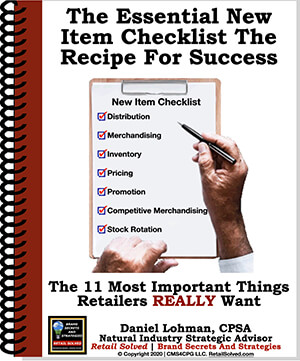
Want A Competitive Edge? The Recipe For Success
New product innovation is the lifeblood of every brand. New products fuel sustainable growth, attract new shoppers and increase brand awareness. Know the critical steps to get your product on more retailer’s shelves and into the hands of more shoppers.
Empowering Brands | Raising The Bar
Ever wish you just had a roadmap? Well, now you do!
Don’t miss out on all of these FREE RESOURCES (strategic downloadable guides, podcast episodes, list of questions you need to be asking, and know the answers to, the weekly newsletter, articles, and tips of the week. You will also receive access to quick and easy online courses that teach you how to get your brand on the shelf, expand distribution, understand what retailers REALLY want, and address your most pressing challenges and questions.
All tools that you can use, AT NO CHARGE TO YOU, to save you valuable time and money and grow your sales today!
Image is the property of CMS4CPG LLC, distribution or reproduction is expressively prohibited.

